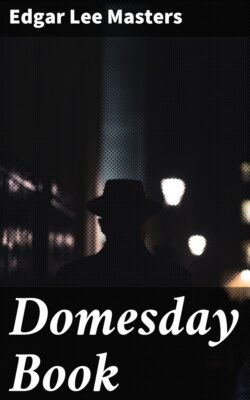| Elenor Murray, daughter of Henry Murray, The druggist at LeRoy, a village near The shadow of Starved Rock, this Elenor But recently returned from France, a heart Who gave her service in the world at war, Was found along the river’s shore, a mile Above Starved Rock, on August 7th, the day Year 1679, LaSalle set sail For Michilmackinac to reach Green Bay In the Griffin, in the winter snow and sleet, Reaching “Lone Cliff,” Starved Rock its later name, Also La Vantum, village of the tribe Called Illini. This may be taken to speak The symbol of her life and fate. For first This Elenor Murray comes into this life, And lives her youth where the Rock’s shadow falls, As if to say her life should starve and lie Beneath a shadow, wandering in the world, As Cavalier LaSalle did, born at Rouen, Shot down on Trinity River, Texas. She Searches for life and conquest of herself With the same sleepless spirit of LaSalle; And comes back to the shadow of the Rock, And dies beneath its shadow. Cause of death? Was she like Sieur LaSalle shot down, or choked, Struck, poisoned? Let the coroner decide. Who, hearing of the matter, takes the body And brings it to LeRoy, is taking proofs; Lets doctors cut the body, probe and peer To find the cause of death. And so this morning Of August 7th, as a hunter walks— Looking for rabbits maybe, aimless hunting— Over the meadow where the Illini’s La Vantum stood two hundred years before, Gun over arm in readiness for game, Sees some two hundred paces to the south Bright colors, red and blue; thinks off the bat A human body lies there, hurries on And finds the girl’s dead body, hatless head, The hat some paces off, as if she fell In such way that the hat dashed off. Her arms Lying outstretched, the body half on side, The face upturned to heaven, open eyes That might have seen Starved Rock until the eyes Sank down in darkness where no image comes. This hunter knew the body, bent and looked; Gave forth a gasp of horror, leaned and touched The cold hand of the dead: saw in her pocket, Sticking above the pocket’s edge a banner, And took it forth, saw it was Joan of Arc In helmet and cuirass, kneeling in prayer. And in the banner a paper with these words: “To be brave, and not to flinch.” And standing there This hunter knew that Elenor Murray came Some days before from France, was visiting An aunt, named Irma Leese beyond LeRoy. What was she doing by the river’s shore? He saw no mark upon her, and no blood; No pistol by her, nothing disarranged Of hair or clothing, showing struggle—nothing To indicate the death she met. Who saw her Before or when she died? How long had death Been on her eyes? Some hours, or over-night. The hunter touched her hand, already stiff; And saw the dew upon her hair and brow, And a blue deadness in her eyes, like pebbles. The lips were black, and bottle flies had come To feed upon her tongue. ’Tis ten o’clock, The coolness of the August night unchanged By this spent sun of August. And the moon Lies dead and wasted there beyond Starved Rock. The moon was beautiful last night! To walk Beside the river under the August moon Took Elenor Murray’s fancy, as he thinks. Then thinking of the aunt of Elenor Murray, Who should be notified, the hunter runs To tell the aunt—but there’s the coroner— Is there not law the coroner should know? Should not the body lie, as it was found, Until the coroner takes charge of it? Should not he stand on guard? And so he runs, And from a farmer’s house by telephone Sends word to Coroner Merival. Then returns And guards the body. Here is riffle first: The coroner sat with his traveling bags, Was closing up his desk, had planned a trip With boon companions, they were with him there; The auto waited at the door to take them To catch the train for northern Michigan. He closed the desk and they arose to go. Just then the telephone began to ring, The hunter at the other end was talking, And told of Elenor Murray. Merival Turned to his friends and said: “The jig is up. Here is an inquest, and of moment too. I cannot go, but you jump in the car, And go—you’ll catch the train if you speed up.” They begged him to permit his deputy To hold the inquest. Merival said “no,” And waived them off. They left. He got a car And hurried to the place where Eleanor lay. … Now who was Merival the Coroner? For we shall know of Elenor through him, And know her better, knowing Merival. |
